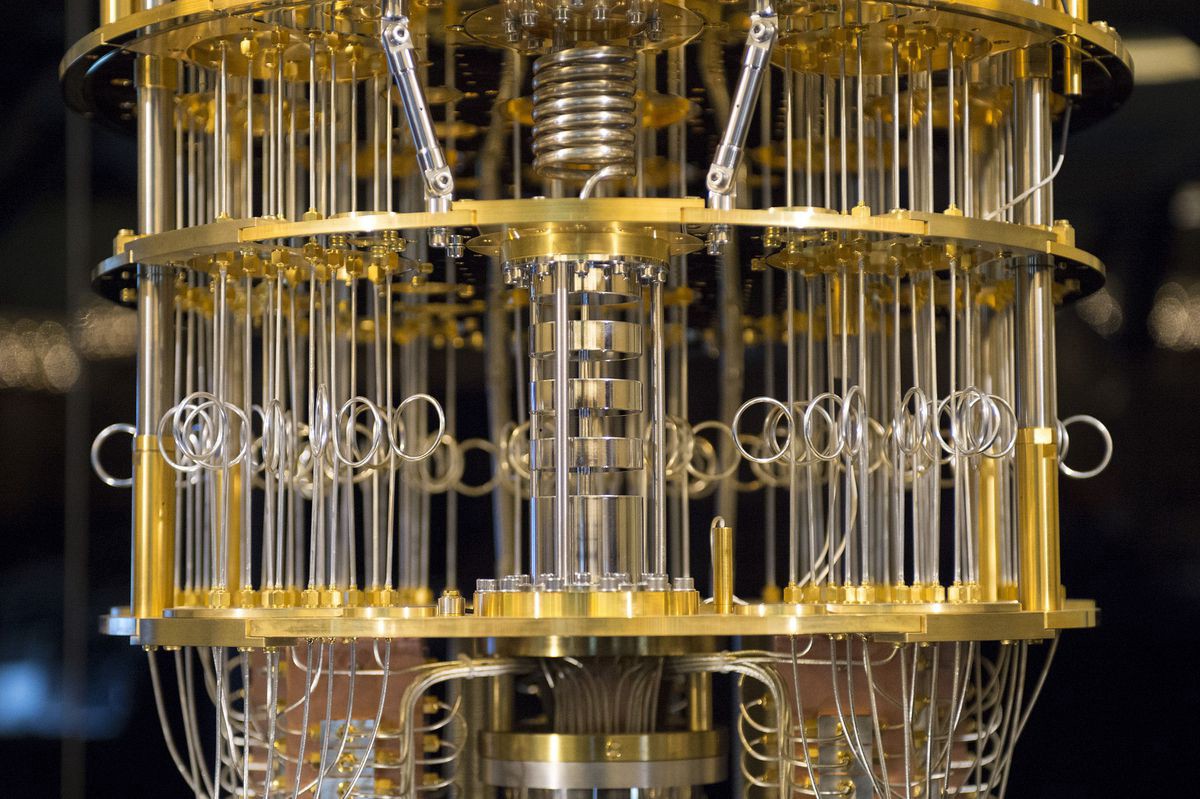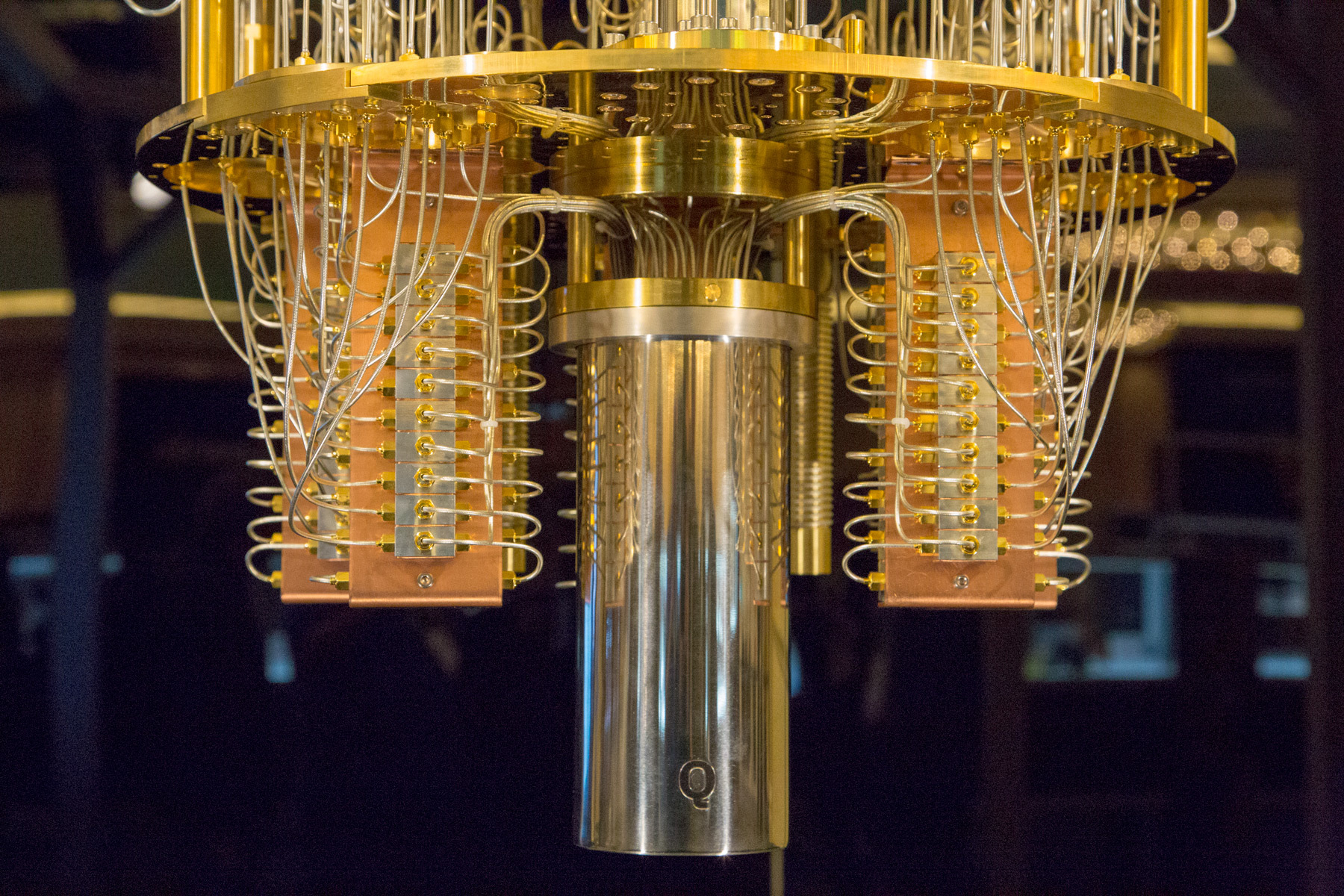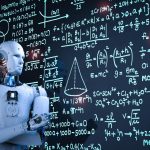The theory behind quantum computing was first laid out in the 1980s. Yet, it was not until recently that practice caught up with theory, enabling the construction of the first quantum computers. An unchallenged pioneer in this technology is the Canadian company D-Wave Systems. Its clients include the CIA and the National Security Agency (NSA), many research institutes, NASA, and businesses including Google and Lockheed Martin. The European Union plans to allocate a billion euros to quantum research. Tech companies are developing their own technologies anticipating diverse applications for the awesome computational power that can be derived from quanta, the fundamental building blocks of matter.
The evening of Moore’s Law
Why is so much being spent on quantum computing? Why is it such a huge breakthrough?
Today’s processors are made up of billions of transistors a few nanometers in size, packed into a very small space. According to Moore’s Law, the number of transistors that fit into a microprocessor doubles roughly every two years.Unfortunately, or inevitably, increases in the processing power of chips have been plateauing. We are approaching the technological limits of how many transistors can be jammed into such a small space. The borderline that cannot be crossed is a transistor the size of a single atom with a single electron used to toggle between the states of 0 and 1.
The simplest way to demonstrate the advantages of the quantum computer is to compare it with the classical machine. The familiar device we know from our daily work relies for all its operations on basic information units called bits. These, however, can only represent two states: 0 or 1.
In quantum computing, it’s possible to use intermediate, non-binary states that liberate us from the bondage of 0 and 1, two opposing values. The qubit(or quantum bit), which is what the information units used by quantum devices are called, can assume the values of 0 and 1 simultaneously. In fact, qubits can assume an infinite number of states between0 and 1, achieving what is referred to as the superposition. Only when the value of a qubit is observed does it ever assume either of the two basic states: 0 or 1.
This may seem like a minor difference, but a qubit remaining in superposition can perform multiple tasks at the same time. We are helped here by the operation of two fundamental laws of quantum physics. Physically, a qubit can be represented by any quantum set to two different basic states: two energy levels in an atom, or two levels of photon polarization, vertical or horizontal. Therefore, while a bit in a classical computer holds one of two values (0-1 or 1-0), and two bits hold one of four values, and so on, two qubits hold not two but four values at any given time while 16 qubits may hold as many as 65536 values simultaneously, or 16 squared. The number of possibilities doubles for every qubit added, allowing a quantum machine to process far more data than can a binary computer in an incredibly short time.
Imagine a volume of data so big it would take millions of years to process by means of a classical computer. This would not be a problem for a quantum machine. It can process data hundreds of thousands and, ultimately, millions of times faster than machines made up of even the most sophisticated silicon components. The difference in capacity between quantum and conventional computers can theoretically amount to an astounding 1:18 000 000 000 000 000 000 times!
Such a computer could sift through and recognize objects in a giant collection of photographs. It would be perfect for big number processing, encryption and code breaking.
Or, blockchain breaking.

The kiss of death for cryptocurrencies
According to some researchers, once quantum computers rise and spread, they could be used to crack the cryptographic protections responsible for the operating model and security of blockchain technology – the technology on which cryptocurrencies are based.
Collectively, on January 3, 2018, cryptocurrencies were worth an estimated USD 700 billion. This certainly makes them worth fighting for. What makes blockchain technology vulnerable to the threat of quantum computers?Blockchain architecture is protected by two types of security keys: private and public. To make a cryptocurrency transaction, the buyer shares a public key with its seller, while the latter uses a private key to acknowledge receipt. Should anyone other than the seller or buyer acquire the private key, they would gain control of the transaction. The private key can either be stolen or broken by the brute force of enormous computational power. The emergence and spread of quantum computers will render the blockchain technology’s algorithms useless. A holder of a quantum computer will be able to calculate the private key using the public key.This will give the code holder unfettered access to all world’s wallets holding all the world’s cryptocurrencies.
However, even though it can crack a private key in minutes, the cost of a quantum computer will make that a very expensive operation.
But $700 billion is a powerful incentive.
Not all is lost
The easiest way to secure keys in the face of quantum computing would be to have the cryptocurrency community adopt a more sophisticated set of cryptographic standards. The technology to do so is out there. However, any modifications require the consent of the entire cryptocurrency community, with separate consents for each cryptocurrency. Considering that a recent attempt to get all users to agree to an increase in the volume of bitcoin (BTC) blocks – from 2MB to 4MB – has failed miserably, reaching a consensus for upping security standards may prove equally elusive. The blockchain protocol requires 80% of currency users to approve any change. Since doubling the bandwidth, and significantly accelerating transactions would benefit everyone, that would appear to be a no-brainer. And yet, as it turned out, not everyone saw it that way.
On the other hand, by the time quantum computers become widely available, the cryptocurrency community may well recognize the threat and begin to see eye to eye on updating cryptographic standards. That would keep blockchain and the cryptocurrency technology secure from quantum computers well into the future.
Devilishly fast but not unlimited
A quantum computer requires a control system (the equivalent of an operating system), algorithms to make quantum calculations and proper calculation software. The development of quantum algorithms is very difficult as they need to rely on the principles of quantum mechanics. The algorithms followed by quantum computers rely on the rules of probability. What this means is that by running the same algorithm on a quantum computer twice, one may get completely different results as the process itself is randomized. To put it simply, to arrive at reliable calculation with a quantum computer, one must factor in the laws of probability – a complex process indeed!
Quantum computers are suited for very specialized and specific calculations as well as algorithms that help harness all their powers. In other words, quantum computers will not appear on every desk or in every home. However, regardless of how much time is needed to generate a given result by means of an algorithm, we can imagine, even today, a situation in which a quantum machine, and only a quantum machine, could solve a problem that mankind desperately needs to solve.
Related articles:
– Why do we care about blockchain technology?
– Only God can count that fast – the world of quantum computing
– Machine Learning. Computers coming of age
– Blockchain – the ultimate financial crash
– Synthetic biology. Matrix, Dolly the Sheep and the bacteria of the future
– Blockchain – the Holy Grail of the financial system?
– Blockchain has a potential to upend the key pillars of our society


Quantum computer IBM 4










John McLean
I was just reading about quantum computing the other day on LinkedIn, though they had the opposite opinion! Great to get both sides.
TommyG
Nice pictures and great read
Zoeba Jones
I found your article both fascinating and frightening in equal measure!! We can only hope that the ethical debate remains high on the global agenda with a clear dialogue redefining war crimes (both human and AI driven) and culpability.
Check Batin
The problem with quantum computing, as the article mentions in passing, is the decoherence problem – a particle interacts with its environment, so that its state transition probability no longer contains interference terms typical of a quantum system. As such, the system behaves classically. To get around this, you need huge amounts of energy to keep the system cold for enough time. This is the barrier between the dream and reality.
My concern about quantum hype is that investors and large corporations are getting on the bandwagon. While it is nice to have money coming into an idea, it isn’t smart money. The decoherence problem was noted in the 70’s, and no one has been able to solve it, but suddenly, now that investors have created a hype bubble, the assumption is that the problem will be solved within 5 years. This is a law of the universe, not something a bunch of kids can write a bit of JavaScript to get around. Once investors lose patience, the money will leave, and probably the more stable grant money will leave as well. Quantum computing as a field will come to a standstill.
Zoeba Jones
Actually we will be still quite far to be able to understand how to optimize us. We will have just a black box with billions of adjustment knobs without precise knowledge how to use them and only limited understanding what they serve for. This will be just the beginning of a long journey.
And99rew
Quantum algorithms for data analysis have the potential to speed up the computations substantially in a theoretical sense, but great challenges remain in achieving quantum computers that can process such large amounts of data.
CaffD
I think impossible is more tightly defined here and uses the proper mathematical definition of impossible rather than talking about it being practically impossible to do classically compute the answer. I think they are using the term impossible as in it’s mathematically impossible for classical computers to find the answer in the same number of computations as the the quantum computer. They are talking about a class of calculations so it’s quite a decent discovery. Often you expect quantum algorithms to be faster than classical ones but it’s hard to prove it for all possible algorithms, even ones you haven’t discovered yet.
Norbert Biedrzycki
A Quantum computer – rather than performing binary math to go through the exact steps you’ve suggested it calculate in an extremely esoteric way (Flipping switches on and off by coercion of electrical current) will instead experimentally place entangled quantum particles (Using microwave bursts) into superposition, to model the coin flip.
The results of this will be read out by other microwaves (Perturbations in the waveform will reflect energy release caused by the qubits “Landing” out of superposition in characteristic ways)
johnbuzz3
Google, IBM, and Intel have each used this approach to fabricate quantum processors ranging from 49 to 72 qubits. Qubit quality has also improved.
Norbert Biedrzycki
Quantum computing is basically a superset of probabilistic computing, which is already quite powerful. The quantum speedup involves the fact that where a random computer’s state is effectively a distribution over all its possible bit patterns which gets sampled at the end, a quantum computer’s state is a probability amplitude vector which you can manipulate with destructive interference to cancel out some of the probabilities while amplifying others.
Check Batin
I think it is very dangerous to package the gate model of quantum computing in with the things that quantum effects can actually accomplish. Using statistical measurements quantum particles to secure a communications channel, generating random numbers, etc. Both are extremely important for cryptography. Adiabatic optimization is also a promising field, but we still haven’t gotten to a point where we can prove that it works better than regular optimizers. What is scary is how the gate model – the most flexible of quantum technology but the least likely to be feasibly implemented – is packaged in with all these other things. You’re packaging two proven successes with one likely success with one not-yet success. Basically, you’re doing with ideas what Wall Street did with mortgage-backed securities – stuff the thing full of badness, and sprinkle in a little goodness.
Zidan78
Apples and Oranges my friend – transistors do not need to be near absolute zero to operate, nor are they subject to time based decoherance (among MANY other differences). On a similar theme, Moore’s law effectively ended for silicon when Apple reached 10nM manufacturing standards, meaning that trace widths are ~ tens of copper atoms wide.
tom lee
Scientists May Have Found a Way to Combat Quantum Computer Blockchain Hacking – The principle is based on Zero-knowledge proofs which allow you to validate information without sharing it.
https://beta.ourmedian.com/files/1523/consensus—immutable-agreement-for-the-internet-of-value
Tesla29
This is an exciting time to combine machine learning with quantum computing. Impressive progress has been made recently in building quantum computers, and quantum machine learning techniques will become powerful tools for finding new patterns in big data.
Oscar2
I would not claim that blockchain is 100% secure. It is secure taking into consideration current state of technology and knowledge. For example, the quantum computers can change the rules across the blockchain space. What is more, if someone, let’s theoretically say a genius is hiding in a basement somewhere in the Northern Siberia, finds a methodology to decipher the currently used hashing functions (sha256 and sha512 being two most recognized), the blockchain as a reference data proof machine will be invalid.
Of course, these are only theoretical considerations, but still, I would not crawl into the narrative of the absolutes.
What makes me wonder is stating that blockchain is better than the traditional databases; it is not, it is different. It has the entirely different purpose of existence. Secondly, in the first sentence, the article is noting that Bitcoin is just one iteration of blockchain (cryptocurrency network), while the author is referring to the Proof-of-Work type consensus which is strictly linked to the two largest cryptocurrencies: Ethereum and Bitcoin.
SimonMcD
Would Quantum computers be able to very quickly generate and check seeds for presence of any IOTAs and perform an attack in that way?
They could, but it wouldn’t get them anywhere. let’s say there was a quantum computer with absolutely ridiculous power and bandwidth that could generate and check the balance of one billion seeds per second. let’s say everyone on earth had one of these computers, and they had all been running since the time the earth was formed. as of now, all those computers would have checked the balance of 0.00000000000000000000000000000000000000000000000000000000000000000000000000000001% of all possible seeds.
Zoeba Jones
[(10^9) seeds per second] * [(7*10^9) humans on earth]*[3600 seconds per hour]*[24 hours per day]*[365.25 days per year]*[4.5*10^9 years since Earth was formed] / [27^81 possible seeds]
it’s rough napkin math and i might be off by 1 or 2 zeros in the percentage since I was just mashing the 0 key on my phone but it at least gives a good idea of how unlikely not just a specific seed, but any seed with a balance is to be guessed at random.
AndrewJo
Since DLT is replicated and synchronized database of transactions distributed across a network of users, manual reconciliation become redundant
Norbert Biedrzycki
Quantum computing use cases
TommyG
A quantum computer exploits quantum physics to rapidly uncover the right answer to a problem by sifting through and adjusting probabilities, while a classical computer will be burning up memory and time looking at each potential answer in turn.
https://www.futurity.org/quantum-computing-simulation-1799802/
Oscar2
Blockchain is immutable. Blockchain uses immutable data structures. You might want to clarify how those 2 opposing statements (back to back) are both true.
TomCat
It’s ~50%, and after one use, it’s 128 bit security, which is equivalent to Bitcoin’s security. It’s statistically possible for it to be higher or lower. https://iota.stackexchange.com/questions/245/what-information-is-leaked-if-i-reuse-an-address
I guess you are insinuating that this is a bad tradeoff for quantum security? If so, I’d like to point out that wallets can be automated to deal with the issue and permanent address solutions are being created, so it’s a temporary inconvenience for a long term security measure. My guess is other coins will have to find solutions once quantum computers come online, and unless they have a plan in place and tested, they won’t have much time in which to work–as we are seeing with BLT it may have effects on other parts of coin design, so kicking the can down the road in hopes that quantum computers are a distant problem may not be the wiser option.
Tom Jonezz
Ugh, lets just hope that there are techniques to design quantum computers, that are sped up by quantum algorithms.
Sounds like profitable nuclear fusion: ready in 20 years
Tom299
By including identity (either tokenized or privacy protection layer) we can allow regulatory controls over the movement of the value.
Karel Doomm2
great insights
Norbert Biedrzycki
Thank you
John McLean
The potential of cryptocurrencies and crypto-assets is really huge. There is a place for new type of comprehensive financial institutions based on blockchain
Karel Doomm2
Good stuff. Thanks
JohnE3
It can not be concealed that blockchains and cryptocurrencies are new and conservatives tend to celebrate such inventions with a wide arc, but there are many wealthy people who are very interested in this technology, because even if it enables being anonymous. Even Bill Gates himself admitted to having BTC during one of the interviews. And the Winklevoss brothers and their investments in the crypto? For 10-20 years, cryptocurrencies may forget and maybe conquer the world like email or the internet.
johnbuzz3
Without proper Identity it will be possible for bad actors to continue to create the same chaos thats occurring today. You will need to be securely authenticated with the system and have the proper access controls to the information. As a result of this problem the majority of the capital market industry is focused on development of private/permissioned DLT that will never allow an Internet based browser access to these private networks. Access will likely occur via proprietary applications or proprietarty+embedded Webkit technology. By linking credentials to individuals, individuals and assets to corporate entities we can create unique cryptographic identification tagging to tradable instruments. Wrapped within a permissioned based privacy friendly security layer it will allow association of people and assets within a hostile environment (such as a public Blockchain running on the internet). This will allow authorized parties to utilize mathematical forensics to trace the chains of ownership yet prevent regulatory snooping. Some will argue that this is a only on-ledger work effort but even ledger work requires on-ramp, off-ramp, data updates, and linked data to off ledger sources.
AndrewJo
This is only possible by removing the 20 year old security technologies that current Blockchain was built on and layer on Identity with privacy protective mechanisms
Oscar2
Quantum internet will—in synergy with the “classical” internet that we have today—connect quantum information processors in order to achieve unparalleled capabilities that are provably impossible by using only classical information.
AndrewJo
Since DLT is replicated and synchronized database of transactions distributed across a network of users, manual reconciliation become redundant
Simon GEE
This is a very great read! Thank you! I am very interested in what comes next. Hope you could illustrate how the four guys can mint/mine more coins and build a whole functioning ecosystem
Zoeba Jones
Knowing the human genome is not the only key. Understanding the human Microbiome and its interactions with different substances is also critical. This is why there will be an opportunity across the Agtech. Companies like hashtag#ProteonPharma are well positioned to take advantage of this with our focus on the human Microbiome and investments in bacteriophages.
DDonovan
Blockchain has enormous potential also in many other segments, not only finances. Smart Contracts, which are based on the blockchain ethereum protocol, can help in the disgustingly complex system of settlements between the streaming platform and the artist. There are many blochcains – practically every cryptocurrency is a different blockchain. There are many applications for Fintech, banking, supply chain. This is definitely a huge future. And all in all it’s simple enough that a distributed and secure database.
TonyHor
Blockchain technology is decentralized by design. It lacks centralized points of vulnerability that can be easily exploited by hackers, and depends on encryption technology in the place of the conventional username-password security system. A user accesses his account through a randomly generated private key. Another feature to take note is that it is transparent, as it is a public record of activities that can be seen by all participants. It has the capacity to automatically update itself every ten minutes and reconciles any transaction that occurred within that time interval.
Zoeba Jones
With great power exists great responsibility and dilemmas. Why at all is said here ‘WE will’ ‘for YOU’? While should be ‘WE will’ ‘for US’. Why to exclude someone from deciding about him/herself?
TommyG
Very true
Adam T
Not gonna happen
Jacek Czyz
Let’s wait a while and see. IMHO it will be an issue
Robert Kaczkowski
Interesting piece
johnbuzz3
If quantum works, Blockchain is the least of your worries, the whole financial system infrastructure have to be reworked.
Norbert Biedrzycki
Blockchain reminds me of internet 10 years ago
TommyG
Very true
TomCat
it is possible to update to 512 or 1024 ecc, and the task will remain difficult. If think in ecc256 some mathematical vulnerability might be found as for RSA and this will need to apply new algorithm
TomK
it is only matter of time and broader qc adoption when any size company will be able to benefit and effectively compete in that space
Adam Spark Two
What is block chain technology and artificial intelligence, surprised banking industry experts are asking questions too. Adding quantum comp only make it more complex. Your real time banking process enhanced, signatures in a timely manner, contract executions collective, collaboration, networking in real time, all due to block chain technology, Artificial intelligence, (Algorithms)- enhancing automation, new distribution centers are powered by it, greatest success Amazon, view some of my posting on new developments with artificial intelligence. its utilized within all industries now; your robo calls are in perfection for data collection and more……………….
Norbert Biedrzycki
The most obvious for those wishing to remain ‘off the trend’ is to pretend this will not happen. Combination of blackchain powered ny quantum comps could jeopardize global economy trust by shunting basic revenue streams. Some may think this would be great, but the result would be catastrophic.
TonyHor
When most people think of blockchain today, they think of cryptocurrencies like Bitcoins and Ethereum and Litecoin. That’s hardly surprising, as Bitcoin’s market ups and downs are breathlessly reported, sometimes on the front pages of newspapers. In fact, there are more than 800 cryptocurrencies traded on different stock markets… and they are just the tip of the blockchain iceberg. Lying beneath the water is the fact that technologies such as blockchain will allow small organizations, and even private individuals, making relatively small capital investments, to disrupt the global economic system by making p2p transactions more secure, reliable, and useful than the traditional trusted third-party. That’s a revolution, no more, no less.
Check Batin
My suspicion is that one day, someone will show through another nice theorem that the threshold is, in fact, unattainable in a scalable architecture. If I am right, quantum computing is doomed to fail. A lot of money has been invested by some very smart people into research on quantum computing, which is why there is a good chance that I am wrong about this.
John Accural
Quantum computers work on continuous quantities, as opposed to discrete digits like digital computers do. It is possible to implement certain algorithms on such computers, whereas no equivalent algorithms exist for digital computers. But this is all theory… after all, we’ve had analog computers much longer than digital computers, but real life analog computers are very limited in accuracy, and errors accumulate very fast.
Jack666
There is a more important underlying question here that I don’t think a lot of people have thought about. If someone does break elliptic curve digital signature algorithm they will be able to steal a significant amount of coins from users on the bitcoin network. This would be obvious grounds for a hard fork — these funds were stolen because of a flaw in the bitcoin protocol (this is different than ETH because ETH’s funds were stolen from a smart contract on top of the ETH protocol).
Mac McFisher
Blockchain is somewhat different. It makes the “understanding/decoding” spread over time and space, like digital spread spectrum radio. Quantum computers will probably work 100000 times faster than our present computers. Just saying. Big data is food waiting to be eaten.
Simon GEE
All depends which blockchain, as different blockchains utilize different signature schemes, which carry with them different levels of quantum resistance.
SimonMcD
Don’t think so. The blockchain as it stands uses ECC for public/private key crypto, which quantum computers can easily break. The blockchain keeps money in a wallet by saying “this money is locked with this hash”, and then someone will have to use their private key to sign a transaction to ‘move’ it someone else’s address; so that they now “control” that money. Since a quantum computer could find the private keys, it could basically start stealing money at will.
Simon GEE
Quantum-resistant crypto is currently much slower than regular crypto, which is why people haven’t felt a need to switch yet; and those cryptographic schemes have been studied far less, and are thus less trusteed. But I think it’s reasonable to believe that Bitcoin developers will fix it before a real threat is encountered.
Norbert Biedrzycki
We have to take precautions on the fast development of quantum computing such that if it becomes strong enough, we should be able to update cryptocurrency systems as soon as possible.
Tom Jonezz
In the future… think of who knew Google 20 y ago and FB 15? And what about China speed and expansion? Disruption may happen in just 5 y from now.
Norbert Biedrzycki
I think that way faster that 5 years. We see it right now
AdaZombie
A high-end ASIC can get ~10^12 hash/sec. If we were to model this roughly as an internal clock of 4 GHz, and a hash being “100 clock cycles”, would be equivalent to 250 cores, this is like 25,000 cores operating in parallel. A quantum computer, at least for the foreseeable future, will probably have a “clock” at least 1000x slower than a classical computer. That means it gets a 25 million time slowdown compared to an ASIC. Which … just about cancels out the bonus it gets from being quantum, in these very rough numbers. Never mind that a quantum computer will cost roughly 1 million times more.
Mac McFisher
Potentially quantum computing would bring the possibility to lay blockchain on the network of quantum computers.
Norbert Biedrzycki
and what would be the difference from what we see now? Chain of blocks run by probability algorithms?
Jack666
If even 5% of coins were not migrated, it could have a potentially disastrous market effect on the value of a given cryptocurrency. Imagine what 1 out of every 5 U.S. dollars being counterfeit would do to the value of a dollar.
John Accural
Very valid point
AdaZombie
What about mining? Well, a quantum computer could mine, also with quadratic speedup. Currently a hash is valid to mine with approximately probability 1-in-2^52. That means a quantum computer could get it with an approximate probability of 1-in-2^26, or a 2^26 = 64 million times speed up.
Tom299
Right now? It doesn’t seem like there’s any reason it would drastically impact it.
Quantum computer can’t break hashes magically (contrary to how many pop-sci outlets might phrase it). They can get quadratic speedup — that is, trying to fully break a SHA256 hash for a quantum computer is like trying to break a merely 128-bit hash for a classical computer. That means they could break a hash 10^38 times faster than a regular computer. Which is, indeed, a lot! But it still would take them 10^38 tries anyway. And it wouldn’t really be parallelizable in the same way, so you couldn’t buy a farm to try it: you’d have to wait for your one machine to finish. (Although that last sentence is likely to stop being true as quantum algorithms improve. But either way, doesn’t matter) So … the chances of a quantum computer ‘breaking’ the blockchain is still basically zero.
Jack666
Given the nature of blockchains, even if an already-existing blockchain were to change their code to incorporate quantum-resistant signatures, that quantum-resistance cannot be applied retroactively. This means that, in order for every existing wallet to remain secure, every single wallet would need to be manually migrated over to a new wallet under the new signature scheme. The functional feasibility of such an endeavor is doubtful.
John Accural
If a quantum computer architecture is built that can take advantage of the threshold theorem and is scalable, such a machine could break the encryption codes used in most forms of secure digital communications, digital rights management, and yes, cryptocurrencies as well. It would represent a major upheaval, to say the very least, requiring the rapid invention and implementation of entirely new encryption methods.
ZoraBora
After peeling off the veneer of the novelty, the supposed advantages of bitcoin et al vanish. The global networks of interactive agencies, corporations, and oversight institutions constantly monitor financial dealings and provide pathways to track physical and digital transfers should anything go awry; why honest businesses would choose the highly risky digital alternative over legitimate channels is a mystery. The most obvious incentive is for those wishing to remain ‘off the radar,’ where the risk may be worthwhile; reverting to a global laissez-faire free for all could jeopardize global economy trust, and bankrupt governments, by shunting their revenue streams. Naive youngsters may think this would be great, but the result would be catastrophic.
Simon GEE
Certainly, the most popular signature scheme, ECDSA (used by Bitcoin and a large number of other cryptocurrencies), is not quantum resistant. A sufficiently powerful quantum computer running Shor’s algorithm would make relatively short work (compared to the millennia needed by conventional computers) of a revealed public key that has been created using ECDSA.
Norbert Biedrzycki
Shor’s algorithm generate the public/private key pairs that cryptocurrency holders use to store and transfer their coins. While public keys can be shown to other users as they are the mechanism used to receive cryptocurrency, the private key allows users to spend their crypto and as such should be kept, as the name suggests, private.
Adam Spikey
It will take years. The ‘libertarian’ trend so hip among younger tech types has given us ‘new’ business models like Uber (reinventing cab and bus services so as to circumvent taxes, trade laws, and labor protection), AirBnB (reinventing hotel and accommodation so as to circumvent taxation, public health and trade laws, and labor protection), and now cryptocurrency, which offers advantages only to those interested in circumventing tax laws, trade laws, consumer protection, and dealing in untraceable, anonymous transactions, while offering even less safeguards than cash transactions.
Simon GEE
I believe that, long term, all blockchains that utilize cryptocurrency will need to be quantum resistant, and utilize a signature scheme other than ECDSA. Quantum computers are not a matter of if, but a matter of when.
Norbert Biedrzycki
Nowadays a private key can’t be mathematically generated from a public key. But quantum computers could be theoretically so powerful, they could link public and private keys or brake the code by brute force. As such, much of the research being done looks to replace blockchain digital algorithms with something else.
Mac McFisher
Being far from understanding all technical details my bet would be either on appearance of blockchain based on quantum computing cryptography or new ecosystem based on complete automation of all processes with us being part of AI and vice versa where there is no need for money anymore.
Jack666
This isn’t really specific to cryptocurrencies — just generalized cryptography. AFAIK there already exist quantum resistant encryption schemes. If there is a break through on quantum computing the cryptography used in bitcoin / ether / monero etc will have to upgrade algorithms they use.